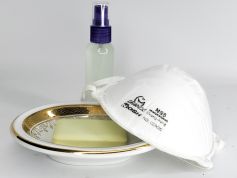At the beginning of this year no one had expected the coronavirus to have the impact that it has. Now, just four months into the year the United States has the most confirmed cases, passing both China and Italy in number of cases and number of deaths related to the virus.
The coronavirus has had a large impact on everyone around the world. In the U.S. food stores are empty with people panic buying, in certain states people are not able to leave their house unless it is for an essential purpose. The coronavirus has had a large impact on healthcare in the United States as well. This does not just mean hospitals, but specialized clinics and other doctors’ offices are affected by COVID-19.
Within these smaller, specialized clinics, supplies are running low. How the office works as a whole has changed in an attempt to keep employees and patients as safe as possible during the pandemic.
As time passes and supplies continue to run thin, some specialized clinics are struggling to get enough personal protective items for their employees.

“The supplies that are the hardest to get right now are personal protective items like masks, gloves, gowns and goggles,” said Rosann Mejia, a licensed practical nurse working at one of these specialized clinics.

Medical suppliers have been limiting the amounts of each item they send to each physician office due to shortages caused by the pandemic. This can make getting these personal protective supplies difficult for offices.
“We find ourselves turning to Amazon to get supplies such as Clorox wipes, Lysol and alcohol because we can’t run out of these necessities at a doctor’s office,” said Mejia.
Due to the shortage of personal protective equipment, the offices need to keep an extremely strict inventory over these items when they do come in.
“When masks come in they are locked up and given out to each employee as needed,” Mejia said. “Same with cleaning supplies, they are inventoried and spread across all offices as needed.”
For the employees, just going to work is completely different due to the pandemic.
“Every employee is given a mask and gloves to wear daily,” Mejia said. “Nurses have masks, gloves and gowns in order to see any patients that come in for an office visit.”
It’s not just the employees who are affected by the pandemic. Any patient that comes into the office is required to wear a mask and is turned away if they do not have one. Also to maintain social distancing as much as possible within the office, there are no sign in sheets for patients.
Another challenge for the people working in these offices is the possibility that patients could come in sick. Many of these people do not realize they are sick and think they are just having a hard time with allergies. Deciding which patients will be seen is an important decision to keep employees safe.
“Some patients do call up for an office visit stating they think their allergies are bothering them and then come in and present a fever,” Mejia said. “When the patient comes in and the nurse triages them and if they have a fever they are asked to leave the building.”

Patients are also asked several questions before they are allowed to make an appointment at the office. Some of these questions are: Do you have a fever? Have you traveled outside the U.S. or have you been exposed to COVID-19? Are you experiencing any body aches or pain? If the patient responds yes to any of these questions they are not allowed to schedule an appointment.
Being an allergy and asthma clinic there are some supplies and medications that they are running low that are regularly prescribed to patients. While there isn’t a shortage of it yet, Z-Pack and other antiviral medications which are prescribed commonly are expected to become much harder to get. These medications are often prescribed at the onset of a more severe sinus or respiratory infection. Inhalers are also getting low in stock.
“We have many patients old and new that are requesting inhalers,” Mejia said. “This can be that they actually need it for the season coming up or in some cases it can be the panic that ‘I get sick possibly an inhaler will help me breathe,’ and since COVID-19 is a respiratory illness, we have seen a spike in these medications.”


